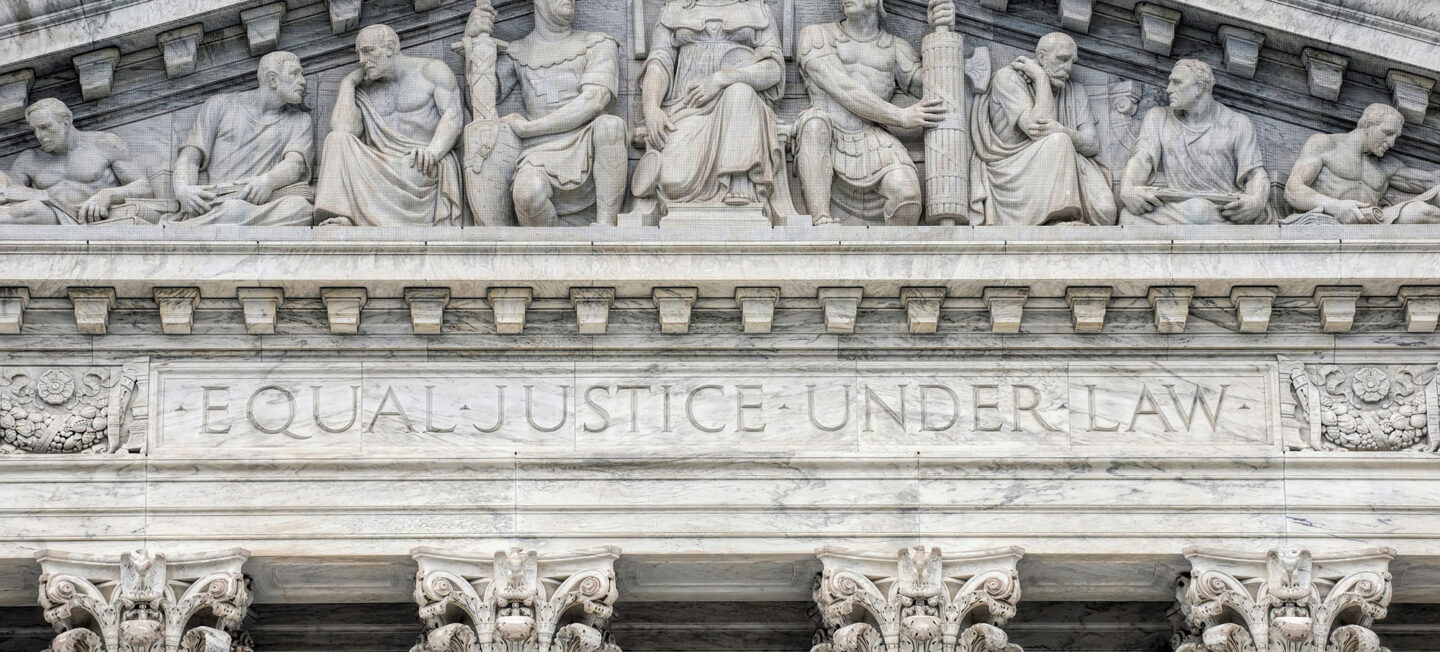Kirsten Berg Holds Power to Account
Alum was at the center of Pro Publica’s Pulitzer-winning investigation of ethics in the Supreme Court

Supreme Court building in Washington, DC. Adobe Stock photo.
In a liberal democracy, good journalism shines a light into the places where darkness reigns. A news story informs the public and keeps those in power honest. At its very best, a story can help right a wrong. Kirsten Berg experienced this first-hand before many journalists have landed their first full-time beat. In fact, Berg (’11) was just an intern and a COM undergraduate when she contributed to a journalistic project that would reshape the way many young people experience the American justice system.
In 2011, Berg had landed an internship with the New England Center for Investigative Reporting (NECIR)—a professional nonprofit news outlet based at COM. Reporting to veteran investigative reporter and NECIR cofounder Maggie Mulvihill, an associate professor of the practice of computational journalism, Berg and a team of reporters looked at the history and efficacy of a Massachusetts law that allowed juveniles to be sentenced to life without parole.

“She taught us all the ropes: This is how you make a difficult call; this is how you use all of these databases to find people; this is how you get data from government sources; this is how you file public records requests,” Berg says of Mulvihill.
The NECIR team’s reporting, published in 2011 and 2012 both at its own website (now archived) and in the Boston Globe, was cited by the petitioners in the US Supreme Court case Miller v. Alabama, where the high court decided automatic sentences of life without the possibility of parole are unconstitutional for defendants under 18 years old. In January 2024, Massachusetts’ Supreme Judicial Court banned such sentencing for defendants under 21.
“It was an amazing thing to get to be doing as someone who’s still in college,” Berg adds. “It really set me up for loving this career.”
Berg’s work continues to put the Minnesota and Iowa native in the reporting center of some of the country’s top news stories. As a research reporter at the nonprofit ProPublica since 2019, she was part of a team nominated for a Pulitzer Prize for its reporting in the first year of the COVID-19 pandemic. In 2023, Berg joined an investigation into the ethics and oversight of the Supreme Court that won the Pulitzer Prize for Public Service on May 6. But Berg doesn’t seem to worry too much about award nominations and wins. She’s more interested in doing the kind of work that helps build back Americans’ eroding view of journalism.
“Investigative journalism is such a foundational part of journalism, which is about holding power to account and telling stories of communities,” Berg says.
The work of a research journalist
ProPublica launched in 2007, filling a void left by print newsrooms that had gutted or eliminated their investigative bureaus. Reporting projects at ProPublica take months or sometimes years to finish, and the work is a collaborative effort, Berg says. As a research reporter, she specializes in obtaining and verifying information—through court records, filing public records requests, mapping out the structures of organizations and conducting archival, legislative and historical research.
There seemed to be a pattern of scandal, of ethical breaches, that seemed to be swept under the rug—of judges being defended, of oversight being thwarted.
Kirsten Berg
Often, Berg is looking for information that the institutions and people at the center of ProPublica investigations do not want to be made public. When the Centers for Disease Control and Prevention (CDC) repeatedly ignored official requests for interviews at the height of the COVID-19 pandemic in 2020, Berg built a spreadsheet of more than 700 current and former CDC employees that included information like how best to reach them (usually on a cell phone) and their role in the pandemic response. “[We also] put together a dossier of what they had done in their careers, and why they might be willing to talk to us, so that when we picked up the phone and called them, we would have a good pitch,” Berg says. “That made a huge difference.” The final piece, “Inside the Fall of the CDC,” published in October 2020, detailed widespread internal strife at a beleaguered agency that was stretched to the limits by the global pandemic. That capstone piece, alongside more than seven months of COVID reporting, earned the ProPublica newsroom a Pulitzer finalist spot in the Public Service category.
By the time Berg joined the four-person investigative team looking into ethics questions at the nation’s highest court in mid-2023, ProPublica had already published the bombshell report showing Justice Clarence Thomas had accepted unreported gifts from Republican megadonor Harlan Crow. Berg was brought on to research the Judicial Conference of the United States, the national policymaking arm of the court system tasked with investigating alleged ethics breaches. “We wanted to look at why and how some of these seeming ethical breaches that undermine the integrity of the court were tolerated, allowed to happen, okayed. [The Judicial Conference] was the organization that was supposed to be policing it,” Berg says. With public information on the secretive organization’s inner workings limited, Berg pored over the archives and media clips that were available to understand how the Judicial Conference had dealt with investigations historically—including Thomas’s. “What we found through that was that there seemed to be a pattern of scandal, of ethical breaches, that seemed to be swept under the rug—of judges being defended, of oversight being thwarted,” Berg says.
Next, for a perspective from inside the Judicial Conference, Berg set out to find judges who comprised the oversight group. But there were a couple immediate roadblocks. For one, the names of the judges that make up Judicial Conference are kept confidential. Berg says she was able to put together a pretty exhaustive list of members using archives of congressional records where names were mentioned, court documents and official conference notices. “One of the best things was their letterhead,” Berg says. “Whenever they sent it out, they had every single member listed [on the letterhead], so we were tracking down when letters had been sent out and then getting all the names from there.”
But even when Berg tracked down most of the conference member names, federal laws protecting judges kept much of their contact information hidden from the public eye. “You have to get creative in tracking down cell phones, addresses, emails for judges,” Berg says. For instance, where information about a judge might not be available, perhaps a reporter could find something listed publicly about the judge’s spouse. Or maybe a phone number was inadvertently listed with a property record connected to a judge. Perhaps a judge or their spouse volunteered at their church or synagogue, and an email was listed in a congregational bulletin. “It’s really different for everyone,” Berg says.
Recognition and new projects
ProPublica’s deep dive into the Judicial Conference, which Berg coproduced with Brett Murphy, is part of the “Friends of the Court” series that led to a Senate Finance Committee investigation and to the Supreme Court adopting a first-ever conduct code. Besides its real-world impact, the series is also racking up some serious nominations and awards. ProPublica has already won USC’s Selden Ring award for investigative reporting and the George Polk Award for national reporting. ProPublica is a finalist for both Syracuse University’s Toner Prize and the Goldsmith Prize from Harvard’s Shorenstein Center on Media, Politics and Public Policy. Most notably, the investigation received the 2024 Pulitzer Prize for Public Service on May 6. But if the nominations and awards mean anything to Berg—who has since investigated Chinese organized crime’s connection to America’s illegal marijuana market—it’s only that they reaffirm the countless hours of reporting, writing and fact-checking the ProPublica team put into the Supreme Court investigation. Berg’s concern remains with the accountability her work—and all investigative journalism—creates for the wealthy and powerful. “I feel like it’s sort of cliché, but right now there’s a lot of distrust of media,” Berg says. “To be able to put out something so transparent and nuanced and ironclad was, in addition to accountability, such a great way to educate the public about how investigative journalism works.”



